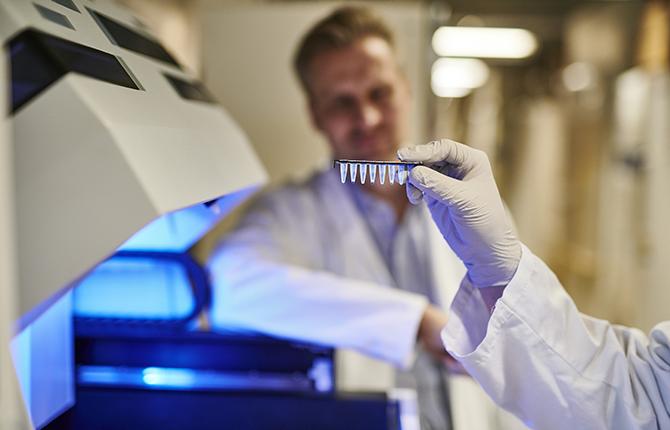
2021 Allocations
Cycle for Survival fights back against rare cancers with 100% of every dollar raised. Funding clinical trials, laboratory research, and technology development at Memorial Sloan Kettering Cancer Center (MSK) leads to new drugs and more effective treatments that give hope and save lives.
2021 Research Programs
With your support, Cycle for Survival raised $25 million in 2021 — bringing us to more than $290 million since 2007.
Within six months of the close of fundraising, 100% of donations are allocated to a wide-reaching research enterprise that includes the world’s best cancer scientists and doctors. The common theme: to advance trailblazing innovations that will help people with rare cancers worldwide.
Human Oncology and Pathogenesis Program
$5,000,000
The Human Oncology and Pathogenesis Program (HOPP) is MSK’s hallmark translational research program that bridges discoveries made in the lab to clinical research, leading to new and improved therapies for cancer. By bringing together a brilliant collective of MSK physicians and scientists who have one foot in the laboratory and the other in the clinic, HOPP serves as a rapid incubator for cancer-fighting strategies. The program, led by Charles Sawyers, MD, focuses on developing novel cancer therapies, often for people with malignancies that lack effective treatments or standards of care.
Dr. Sawyers is Chair of HOPP and Marie-Josée Kravis and Henry R. Kravis Chair in Human Oncology and Pathogenesis.
Molecular Pharmacology Program
$2,050,000
Discovering cancer drugs is an exploratory process. The Molecular Pharmacology Program at the Sloan Kettering Institute (SKI) unites investigators from multiple fields to study how drugs interact with cancer cells and fast-track the development of diagnostics and therapies for people with cancer. The program is led by David Scheinberg, MD, PhD, who works in tandem with researchers including Michael Kharas, PhD, to identify vulnerabilities in cancer cells that can be targeted with novel drugs — and apply those discoveries to directly benefit patients.
Dr. Scheinberg is Chair of the Molecular Pharmacology Program at SKI, Director of the Experimental Therapeutics Center, Deputy Director for Therapeutic Discovery at SKI, and Vincent Astor Chair.
Dr. Kharas is a Member of the Molecular Pharmacology Program at SKI.
Department of Medicine
$2,000,000
Outpatient cancer care is frequently associated with a better quality of life, and MSK is adapting its cancer care delivery methods to maximize impact beyond the hospital’s walls. Deb Schrag, MD, MPH, was recently named MSK’s Chair of the Department of Medicine. In this role, she works closely with MSK leadership, including Lisa DeAngelis, MD, to identify key initiatives that will advance MSK’s mission. These include establishing a research laboratory dedicated to innovation in care delivery, mentoring trainees, and collaborating with clinicians, researchers, and staff across disciplines to set a new standard to improve cancer care delivery worldwide.
Dr. Schrag is Chair of the Department of Medicine.
Dr. DeAngelis is Chief Physician Executive, Chief Medical Officer, and Scott M. and Lisa G. Stuart Chair.
Cancer Biology and Genetics Program
$1,705,000
The Cancer Biology and Genetics Program at the Sloan Kettering Institute (SKI) brings together experts across cancer science to uncover how variations in cell processes caused by DNA mutations contribute to tumor growth. Armed with tools like MSK-IMPACT™, a tumor-sequencing test that identifies mutations in 505 cancer-associated genes, doctors can identify the Achilles’s heel of a malignancy, resulting in novel tailored therapies to treat many types of cancer. Scott Lowe, PhD, Robert Benezra, PhD, and Luis F. Parada, PhD, are leveraging the resources of this collaborative program to study the biology and genetics of tumor formation and metastasis across multiple cancer types.
Dr. Parada is Director of the Brain Tumor Center and Albert C. Foster Chair.
MSK Kids
$1,540,000
Cycle for Survival is proud to fuel studies led by MSK Kids, the largest pediatric cancer program in the country and home to a specialized precision oncology initiative singularly focused on childhood cancers. At MSK Kids, doctors and scientists are working to gain a deeper understanding of pediatric cancers and how they differ from adult diseases, and developing treatments that are more effective and less toxic.
In January 2021, MSK established the Tow Center for Developmental Oncology (TCDO), an interdisciplinary translational research hub founded to address the distinct causes of cancer in developing tissues in children and young adults. The TCDO galvanizes investigators across MSK to improve outcomes for these rare cancers. Cycle for Survival funding was foundational to the launch of the TCDO, and ongoing support from the program will power new advances and breakthroughs that help save young lives around the world.
Learn more about MSK Kids.
Epigenetics Innovation Labs
$1,500,000
Epigenetics is the study of how genes are switched on and off without altering a person’s actual DNA sequence. Age along with environmental factors such as diet, exercise, drugs, and chemicals can affect epigenetic mechanisms of gene control. These changes can result in disease — and in fact, malfunctioning epigenetic processes have been found in almost all types of cancer. Epigenetics holds valuable information about the potential causes of cancer and can be used to identify therapeutic targets, which is the first step in drug development.
MSK’s Center for Epigenetics Research (CER) was established in 2015, and Cycle for Survival has been proud to support the initiative since its launch. Within the CER, the Epigenetics Innovation Lab was created to better understand how epigenetic aberrations contribute to the development and progression of cancer. Under the leadership of Iestyn Whitehouse, PhD, scientists in the Epigenetics Innovation Lab are developing technologies to study cancer-associated epigenetic changes in the hope of discovering new treatments.
Dr. Whitehouse is Interim Director of the Center for Epigenetics Research.
Developmental Biology Program
$1,150,000
Studying how cells form healthy tissues and organs gives researchers key insights into how tumors develop. Recent advances in microscopic imaging are allowing them to visualize tissues at a greater resolution than ever before. With the help of Cycle for Survival, the Developmental Biology Program at the Sloan Kettering Institute (SKI) acquired two light-sheet fluorescence microscopes in early 2021 to unveil the inner world of cells and tissues. Anna-Katerina Hadjantonakis, PhD, and Alexandra Joyner, PhD, are using this and other forms of high-resolution imaging to track the development of distinct populations of cells. Observing how cells organize and repair damage in tissues and organs in real time helps scientists understand how these processes go awry in cancer and come up with new strategies to halt the progression and spread of disease.
Dr. Hadjantonakis is Chair of the Developmental Biology Program at SKI and Alfred P. Sloan Chair.
Dr. Joyner is a Member of the Developmental Biology Program at SKI and Courtney Steel Chair.
Translational Research
$1,000,000
Bringing new drugs to people with cancer is one of MSK’s greatest strengths. Translational research serves as a bridge between the laboratory and the clinic, often resulting in the accelerated development of novel diagnostics and therapies. Memorial Hospital’s Translational Research Program, led by Lisa DeAngelis, MD, provides support for physician-scientists to embark on clinically driven research initiatives across MSK.
Ross Levine, MD, was appointed to the recently created role of Deputy Physician-in-Chief of Translational Research at Memorial Hospital. In this capacity, he will oversee translational research within Memorial Hospital including Memorial Hospital Collaborative Research Centers. He will also collaborate with department chairs to support physician investigators.
Dr. DeAngelis is Chief Physician Executive, Chief Medical Officer, and Scott M. and Lisa G. Stuart Chair.
Dr. Levine is Deputy Physician-in-Chief of Translational Research at Memorial Hospital and Laurence Joseph Dineen Chair in Leukemia Research.
Sarcoma
$770,000
MSK’s Sarcoma Medical Oncology Service, led by William Tap, MD, is one of the world’s largest and most productive programs dedicated to sarcoma. To rapidly grow the arsenal of research and therapeutics to combat the 100-plus types of the disease, MSK doctors and scientists are running more than 30 clinical trials at a time, studying ways to manipulate how drugs work and predict if a therapy will be effective for a patient before it’s prescribed, saving crucial time.
One of Dr. Tap’s areas of focus is sarcoma among adolescents and young adults, representing around 8% of cancer diagnoses in this group compared to 1% in older adults. These patients, who are between age 15 and 39, are often underserved in care settings and underrepresented in clinical trials. In 2021, MSK established the Lisa and Scott Stuart Center for Adolescent and Young Adult Cancers to expand its dedicated research and treatment programs for these young people with cancer. Cycle for Survival is proud to support this initiative to help bridge the gap between pediatric and adult care, meet the unique needs of these patients, and ensure better outcomes for all.
Dr. Tap is Chief of the Sarcoma Medical Oncology Service.
Single-Cell Analytics Innovation Lab
$750,000
The Single-Cell Analytics Innovation Laboratory (SAIL) at MSK is a leading platform for advanced molecular profiling and data analysis and is led by Dana Pe’er, PhD, and Ronan Chaligné, PhD. Dr. Pe’er pioneered several foundational analytical concepts and algorithms in the single-cell field. Dr. Chaligné is an expert in single-cell technologies and their application to biological questions, and he has developed methods to profile multiple data types from the same cell.
SAIL is a collaborative initiative within the Alan and Sandra Gerry Metastasis and Tumor Ecosystems Center. Funding from Cycle for Survival will allow the team at SAIL to serve the broader MSK community by deploying spatial transcriptomics, an innovative technology that allows researchers to measure all the gene activity in a tissue sample and map where the activity is occurring.
These approaches will provide unparalleled insight into cancer-related questions around immunity, tumor plasticity and metastasis, regeneration, wound healing, and immunotherapy. SAIL’s mission is to assimilate emerging technologies in the rapidly advancing fields of single-cell sequencing and imaging-based profiling, in addition to providing robust analytical solutions.
Dr. Pe’er is Chair of the Computational and Systems Biology Program at SKI, Scientific Director of the Alan and Sandra Gerry Metastasis and Tumor Ecosystems Center, and Alan and Sandra Gerry Endowed Chair.
Dr. Chaligné is Director of the Single Cell Research Initiative.
Proteomics
$750,000
Proteomics is the study of the structure and function of proteins, including the way they work and interact with each other inside cells. The Microchemistry and Proteomics Core at the Sloan Kettering Institute (SKI) performs large-scale analysis of proteins to understand how healthy cells are rewired to become cancer cells. In recent years, cancer proteomics has led to key discoveries about tumor growth and metastasis, as well as the identification of new biomarkers and targets for therapeutics, the first step in drug discovery. Cycle for Survival funding will allow SKI to acquire the latest generation of mass spectrometers to help investigators better understand the role that specific proteins play in cancer.
Molecular Biology Program
$590,000
The mission of the Molecular Biology Program at the Sloan Kettering Institute (SKI) is to understand how an organism’s ability to repair damage to its own DNA is correlated with the development or progression of cancer.
A network of pathways known as the DNA damage response is a particular area of interest for developing cancer therapeutics. In the lab of John Petrini, PhD, SKI scientists are investigating these DNA-repair pathways to shed light on cancer at the molecular level and discover new treatments that can target these mechanisms.
Dr. Petrini is Chair of the Molecular Biology Program at SKI, Director of the Functional Genomics Initiative, and Paul A. Marks Chair in Molecular Cell Biology.
Radiation Treatment With Fewer Side Effects
$300,000
Advances in radiation therapy, driven by improvements in imaging and treatment delivery methods, have refined doctors’ ability to precisely target tumors with radiation while minimizing damage to healthy tissue. Joseph Deasy, PhD, and his colleagues are using computer simulation models to predict the response of cancer to different radiation doses and treatment schedules. By optimizing radiation doses for each patient and carefully monitoring responses with imaging, doctors can eliminate unnecessary treatments and reduce side effects.
Dr. Deasy is Chief of the Service for Predictive Informatics, Chair of the Department of Medical Physics, and Enid A. Haupt Chair in Medical Physics.
March Challenge
$1,000,000
In March 2021, the Cycle for Survival community rallied to raise $1.5 million, $1 million of which was awarded to Dana Pe’er, PhD, and Sohrab Shah, PhD — who lead MSK’s Computational and Systems Biology Program and Computational Oncology, respectively. The funds will be used to acquire much-needed advanced technology, including laboratory and computing equipment, to accelerate research and drive progress.
Computational biology and oncology use clinical and molecular data gathered over time to predict how cancer will respond to different therapies. This valuable analysis can guide treatment decisions so people with rare cancers can take the most effective route to attack their disease. MSK is home to one of the largest data sets anywhere, and researchers are using this abundance of information to uncover cancer’s origins and vulnerabilities. The findings promise to be instrumental in changing the lives of people around the world.
Dr. Pe’er is Chair of the Computational and Systems Biology Program at the Sloan Kettering Institute, Scientific Director of the Alan and Sandra Gerry Metastasis and Tumor Ecosystems Center, and Alan and Sandra Gerry Endowed Chair.
Dr. Shah is Chief of Computational Oncology in the Department of Epidemiology and Biostatistics at Memorial Hospital and Nicholls-Biondi Chair.
Equinox Innovation Initiative (Grants Program)
$2,000,000
The Equinox Innovation Initiative — named in honor of Cycle for Survival’s founding partner — fuels game-changing research that embodies the spirit of Equinox. These coveted grants are awarded to MSK physicians and scientists annually through a highly competitive process and enable them to pursue leading-edge research with speed and agility.
The 2021 award recipients are James Fagin, MD; Liang Deng, MD, PhD; Wenbin Xiao, MD, PhD; Luis Parada, PhD; and Santosha Vardhana, MD, PhD.
58,000+
Since it launched in 2014, MSK-IMPACT™ has been used to sequence more than 58,000 tumors.
Larotrectinib
Cycle for Survival supported research and clinical trials that led to the FDA’s initial approval of the first drug to treat tumors based on a genetic mutation as opposed to location in the body.
Only 4-5%
All pediatric cancers are rare cancers, but only 4-5% of the National Cancer Institute’s budget is dedicated to researching pediatric cancers. Cycle for Survival helps fill this funding gap.
400+
MSK treats more than 400 subtypes of cancer each year, including some of the rarest forms of the disease.

Directed Support
Each project that Cycle for Survival funds is a bold step toward better ways to fight rare cancers. Every breakthrough starts with a team of dedicated scientists working together to make new ideas a reality for people around the world facing these rare diseases. Every year, Cycle for Survival recognizes the potential of a wide range of research projects and topics — any one of which could profoundly change the lives of people with cancer and their loved ones.
Share Your Impact
Use the images below to let your friends and family know about the rare cancer research you’re supporting this year through Cycle for Survival. Share a post on social media or send your donors an email to thank them for their support.
